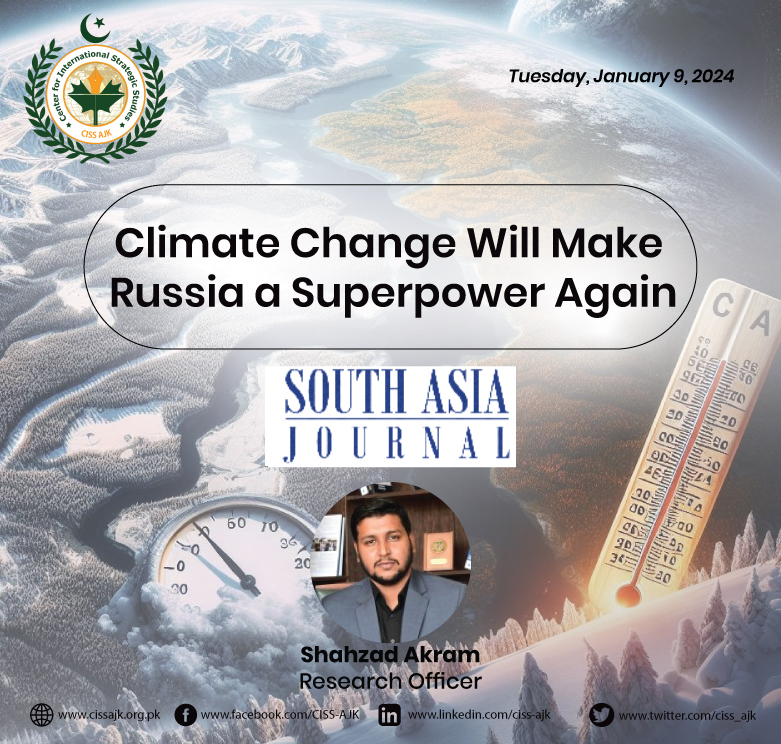656
Climate change will transform Russia from a struggling superpower to a global superpower once again. The three significant geographic challenges that have limited Russia’s development are most of its land is an inhospitable frozen wasteland, most of its coastline is covered with ice, and its borders to the west are on a huge open field, making it susceptible to invasions.
These challenges will be lifted as a result of climate change, and Russia’s economy will be given a tremendous opportunity as the zone for maximum human productivity moves north. Russia, which controls the largest amount of territory in the Arctic, will be particularly well positioned to exploit this change, with massive natural resources and the ability to export oil and gas. Russia’s energy and mineral resources make it a superpower. The Arctic Silk Route offers a shorter and more efficient shipping route compared to the traditional Southern Sea Route, saving both time and distance. Russia has set ambitious targets to transport over 100 million tonnes of cargo annually from Russia to China through the Arctic Silk Route by 2030, indicating the significant economic potential of this route.
If humans continue to emit carbon dioxide at high rates, roughly half of Siberia could become available for farming by 2080, making Russia’s agricultural potential even greater. Their current population is not as susceptible to the effects of climate change as other countries, and their landlocked position makes them naturally resilient to rising sea levels. Additionally, Russia’s resources, agricultural potential, and geographic position make it well-suited to become a superpower in the future. The melting of Arctic sea ice is benefiting Russia in numerous ways, from increased economic opportunities to greater access to new resources.
The Northern Sea Route (NSR) is becoming increasingly popular as a shorter and more efficient way to transport goods between Asia and Europe, saving time and money for companies. With the melting ice, the NSR is now usable year-round, and Russia stands to profit greatly from transit fees through its exclusive economic zone. Furthermore, the melting of Arctic sea ice presents an opportunity to lay submarine high-speed fiber optic cables, finally closing the digital gap between Europe and Asia, and cementing Russia’s geopolitical influence on both continents. Russia has developed floating nuclear power plants that can withstand extreme weather conditions and provide electricity to remote areas, showcasing its technological advancements in the Arctic region. Russia’s construction of floating power plants in the Arctic region not only strengthens its control over mining activities but also enhances its military power with the establishment of military bases, potentially posing a challenge to the US in the region. The melting of Arctic sea ice is benefiting Russia in numerous ways, from increased economic opportunities to greater access to new resources.
Climate change will transform Russia from a struggling superpower to a global superpower once again. The three significant geographic challenges that have limited Russia’s development: most of its land is an inhospitable frozen wasteland, most of its coastline is covered with ice, and its borders to the west are on a huge open field, making it susceptible to invasions. These challenges will be lifted as a result of climate change, and Russia’s economy will be given a tremendous opportunity as the zone for maximum human productivity moves north. The Arctic region is rich in valuable resources such as uranium, gold, oil, and gas, making it a strategic area for countries like Russia and the USA. Russia’s Arctic region holds a significant amount of undiscovered gas and oil reserves, attracting the attention of various countries including China, Turkey, India, Saudi Arabia, and UAE. Russia, which controls the largest amount of territory in the Arctic, will be particularly well positioned to exploit this change, with massive natural resources and the ability to export oil and gas.
Russia’s energy and mineral resources make it a superpower. Russia exports most of its natural gas directly to Europe through 12 pipelines, and the largest natural gas fields are located in western Siberia. The speaker states that if humans continue to emit carbon dioxide at high rates, roughly half of Siberia could become available for farming by 2080. The speaker also notes that Russia’s agriculture is already a significant contributor to the global market and that the warming climate will further increase their agricultural potential. Additionally, Russia’s population is not as susceptible to the effects of climate change as other countries, and their landlocked position makes them naturally resilient to rising sea levels. Russia’s natural resources, agricultural potential, and geographic position make it well-suited to become a superpower in the future.
Russia is confident that the development of the Arctic Silk Route will significantly boost its GDP by 2% and unlock a wealth of 15 to 20 thousand billion dollars in the region. Russia is actively reconstructing and building new military bases in the Arctic, indicating its strategic focus and increasing military presence in the region.



